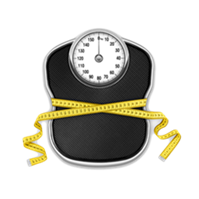Weight loss occurs when the body expends more energy (calories) than it takes in. This energy imbalance can be caused by a combination of factors, including diet, exercise, genetics, and medical conditions.
Caloric deficit: The most basic cause of weight loss is creating a calorie deficit, meaning burning more calories than you consume. This can be achieved by reducing the number of calories you eat, increasing the number of calories you burn through physical activity, or a combination of both. A calorie deficit of 500-1000 calories per day is considered safe for most people and can result in 1-2 pounds of weight loss per week.
Diet: The food you eat plays a major role in weight loss. Eating a healthy, balanced diet that is high in fruits, vegetables, lean proteins, and whole grains and low in processed foods and sugary drinks can help you create a calorie deficit and lose weight.
Exercise: Physical activity is essential for weight loss. Exercise not only burns calories but also helps increase muscle mass, which can boost metabolism and aid in weight loss. Aim for at least 30 minutes of moderate-intensity exercise, such as brisk walking, cycling, or swimming, every day. Resistance training, such as weightlifting, can also help boost your metabolism and burn calories.
Genetics: Genetics can play a role in weight loss. Some people may have a higher tendency to gain weight due to their genetic makeup. However, this does not mean that weight loss is impossible, but it may require more effort and a tailored approach.
Medical conditions: Certain medical conditions can also contribute to weight loss. These include thyroid disorders, certain types of cancer, and gastrointestinal disorders. If you have a medical condition that may be affecting your weight, it is important to consult with a healthcare professional.
Hormonal imbalances: Hormonal imbalances can also affect weight loss. For example, low levels of thyroid hormones or insulin resistance can slow down metabolism and make it harder to lose weight.
Stress: Stress can also affect weight loss. Stress can cause an increase in the hormone cortisol, which can lead to weight gain and make it harder to lose weight.
Sleep: Lack of sleep can also affect weight loss. Sleep deprivation can lead to weight gain by increasing hunger and cravings and slowing down metabolism. Aim for 7-9 hours of sleep per night.
Medications: Certain medications can also affect weight loss. Some medications can cause weight gain as a side effect, while others may cause weight loss. If you are concerned about the effect of a medication on your weight, consult with a healthcare professional.
It’s important to remember that weight loss is a complex process that is affected by a variety of factors. A combination of a healthy diet, regular exercise, and lifestyle changes can help you achieve sustainable weight loss. Consult with a doctor or dietitian before making any major changes to your diet or exercise routine.







